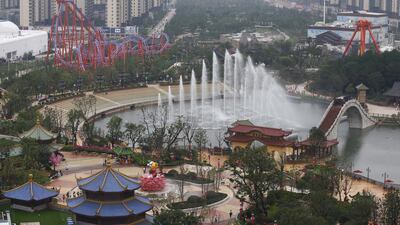China's richest man, Wang Jianlin, this week surprised many by offloading 13 cultural tourism projects and 76 hotels in his enormous conglomerate Dalian Wanda Group's tourism portfolio to the property developer Sunac based in Tianjin near Beijing for a sum of US$9.3 billion.
The move shocked the local market, although the decision to sell came after Wanda was first investigated for suspicious financial dealings and then cleared by regulators in recent weeks.
It is not clear if the sell-off would affect the company's latest project, the $6bn Harbin Wanda City, which comprises a theme park, a theatre, shopping mall, post residential buildings, hospital and the world's biggest indoor ski resort.
Mr Wang has made waves in recent years with high-profile purchases such as the Hollywood studio Legendary Entertainment for $3.5bn and later AMC Theatres for $2.6bn, which made him the biggest movie exhibitor in the United States. He has also acquired some major London properties, including a £80 million (Dh377.9m) home in upmarket Kensington in 2015. But he faced a rare setback early this year when he was forced to abandon a $1bn takeover of Hollywood-based Dick Clark Productions.
Explaining his decision to sell off a major chunk of his tourism portfolio, Mr Wang said all proceeds from the deal would be used to repay loans and lower the group's debt to asset ratio. Wanda has been under pressure from a high level of debt and is looking to pay off as much of its bank loans as possible by the year end and clear all its debts within the next three years,
The deal is a step closer for Dalian Wanda Commercial Properties, the property unit of Wanda, to relist on the mainland and cash in on higher valuations on domestic markets after it delisted in Hong Kong last year.
The sell-off has given rise to speculation about whether Mr Wang was preparing to move deeper into the property market and list the division of his company to take advantage of the high prices available currently in the mainland and Hong Kong, as well as elsewhere such as London. But a section of the market feels he was forced to lighten his debt and get rid of doubtful assets to avoid government investigations becoming a serious problem.
The deal will boost the net worth of the acquiring company, Sunac, by nearly 300 per cent, market sources say. However, there are also concerns that Sunac's level of debt, which has been fuelled by its acquisition spree, will rise sharply. A Bloomberg analysis says Sunac's debt rose 162 per cent in 2016. Whatever, the acquisition will have to pass the test of shareholders' approval and regulator's scrunity before it goes through.
In recent months, China has enhanced controls against capital flight, ordering companies to stay away from foreign acquisitions in what the government regards as non-priority areas such as entertainment and sports. This was seen as a veiled criticism of Wanda's recent purchases of football clubs, film and television production facilities and property across the world.
The new sell-off will lead to a major shift in Wanda's business focus and possibly result in the company investing more within the country than overseas. Wanda and Sunac say there are synergies in their businesses, particularly the portion of Sunac's investments in LeEco, the Chinese multinational technology conglomerate founded by Jia Yueting. This year, LeEco raised some $2.2bn of fresh capital and said it will use a portion of that to buy up the Chinese film production company, Le Young Pictures.
"Sunac's investment in LeEco may fit well and create synergies with Wanda's ambition of developing innovative and asset-light business. This may make the deal a winning growth formula for both parties," says Hannah Li Wai-han, a strategist at UOB Kay Hian Hong Kong.
Analysts are also asking if authorities had a role in bringing about this deal because the government closely monitors the property market; the low profit levels and high debt burden of Sunac would normally put off companies from venturing into a deal of this size.
Investors may do well to be cautious. On Monday, CreditSights maintained its “underperform” on Sunac, notes citing its aggressive and debt-reliant model.

